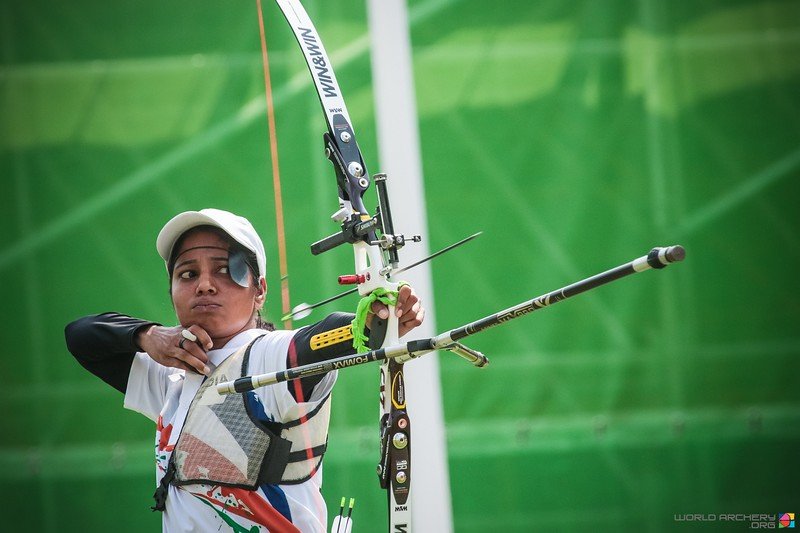
Discrimination, Disability, and Dreams: Pooja Khanna Overcame All Odds To Win
August 18, 2016. Sakshi Malik delivered India its first medal of the 2016 Rio Games, almost out of the blue, sending a whole nation into ecstasy. Suddenly Indian women’s wrestling became hugely popular, and people were talking about Rohtak, the place where Sakshi came from.
There is no denying that it has been a monumental year for Indian women in sports. While there were Sindhus, Sakshis, and Dipas who made headlines, against all the odds few athletes excelled in sports they are passionate about and inspired others to do the same.
Exactly a month later, India sent 19 athletes to the Paralympic Games, its largest delegation ever. But this was the first time in history that an Indian para-archer competed in the Games.
Pooja Khanna is another athlete from Rohtak. But her long path to Rio de Janeiro was not paved in gold. She has seen several hardships and has sacrificed a lot to put her on the road to success.
As an archer, her sport’s not one of the costliest of Olympic pursuits. Equipment costs are limited to bows and set of arrows. But she still needed an elite-level coach. She had to pay travel expenses for events in India and internationally. As a full-time athlete, she needed to figure a way to pay for housing and food.
To passersby in her village, Bhola Ram, her father was just another bin-collecter-turned-scrap-vendor, someone they ignored on their way to work. An old man scratching a living from other people’s waste.
But to Pooja, he is a shining example of a selfless Indian father, working long and hard with no thought for her comfort to ensure she can have a life, only can only dream of.
Realising all the misery that her father had gone through to help her, being bullied by people and being looked down on by passersby, Pooja decided to do something for him in return. “My parents initially were not for me taking up the sport. Firstly, because of my disability and obviously the financial condition was another reason. It was only after the intervention of my coach Sanjay Suhag, an ex-serviceman, and the medals in the state-level and national-level competitions that they started supporting me,” she said on the sides of the GoSports Foundation’s annual awards function in Bengaluru.
Diagnosed with poliomyelitis during childhood, her original plan was to compete at the highest level in shooting. A few years later, she went to her first Games but in a different sport. “There was very little scope in shooting at Rajiv Gandhi Stadium in Rohtak. Also, the cost was on the higher side.”
What makes her stand out from other athletes is the fact that she learnt a sport in two-and-a-half years. After she had given up on her dreams of shooting, it was no the archery field that she found her new home. “I picked up my bow in 2014 after three years of discus throw. Archery made strong and taught me the meaning of strength,” she added.
It was then Pooja decided she is going to beat disability and disability is not going to beat her.

She finished the ranking round at the 29th spot with a total of 513 points which saw her face 4th placed Poland’s Milena Olszewska in the Round of 32 at Sambadrome, where she went down by a scoreline of 2-6 inside four sets. “The 5th-place finish at the final qualifier in the Czech Republic was my only competition before the Paralympics. In Rio, things were a little different. I was a bit nervous, and pressure got the better of me. But you can beat anything with determination. These are my formative years, and if I want to be the best, which I do, a lot of more sacrifices will be made. But I will love to come back from Tokyo with a medal.”
There were hard times but in an unusual turn of events Pooja has achieved one of her dreams. She prefers to call it almost a miracle. And why not?
Coming from a Dalit community, she had to bear the brunt of discrimination. Although Indian constitution banned the practice of untouchability, it is still very much in use. “When I used to train at the ground, there were a few boys who never used to drink water from my bottle. Not only that, there were days when I was asked not to drink water from a public tap. But things are slowly changing. My village and neighbourhood have now recognised my talent.”
This archery journey has given her a stage for encouraging and motivating upcoming para-athletes. A lot of times, people think they have limitations, but Pooja thinks it is just a belief they have. The 25-year-old wants to be recognised among both able-bodied and para-athletes. Asked what message she would like to send to other people with disabilities around the world, she perked up, “Don’t let disability defeat you.”
While she will turn out to the World Championships next month, the people of Rohtak will be hoping for more glory from another proud daughter. Like Rohtak, perhaps the country will cheer along.
 All section
All section













